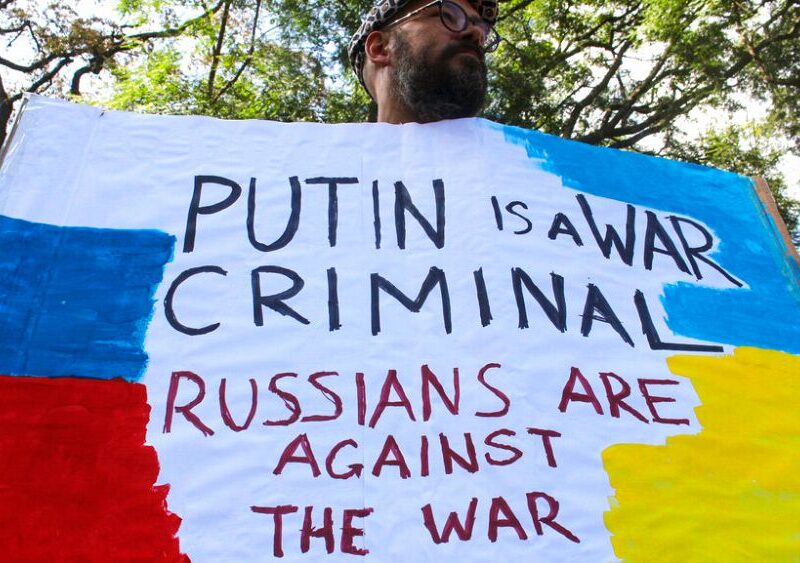[ad_1]
Some accuse Russians living in Europe of “wanting everything, but doing nothing”, while others claim many are opponents of Putin in need of support.
“My dream was always to move to Europe,” says Ivan Sidorov. He did not give his real name, over fears for his immigration status and family in Russia.
Surprised at how easy it was to come to the EU, the 31-year-old found a job and moved to Lithuania from St. Petersburg last September – just weeks before Russia announced its partial mobilisation.
He saw his future in Europe because of the dire state of affairs back home.
“Our president, government, regime – we can’t change anything. If we try, we risk going to jail. Previously, I thought we had a chance. But I realised it is pointless,” Sidorov tells Euronews.
“Their rule is too strong.”
When Russian tanks thundered into Ukraine in February 2022, Sidorov went to several anti-war protests in St. Petersburg. While he managed to avoid the heavy hand of the law, thousands of Russians were arrested, beaten and imprisoned by the security forces for their dissent.
‘There’s nothing we can do to change the situation’
Despite opposing the Russian government, Sidorov says politics is relentlessly thrust upon him.
“Before I moved here, I thought it was mostly a myth that there are political issues between ordinary people, like me. I thought everyone understands that it is just politics and those who leave Russia are against all of this and that it wasn’t their choice.”
“But when I came I was surprised at how difficult things were.”
“When people realise I am from Russia, I can see their face change,” he adds.
Support for Ukraine is very high in Lithuania. Many are scathing of Russia, scarred by what they call the occupation, exploitation and Russification of their country under the USSR, though there is ambivalence in some quarters.
Sidorov says a “psychological bug” inherited from history, positions Russians as enemies in peoples’ minds, even if the person they encounter is ok.
He recalls times when others have been aggressive, hostile or relentlessly questioned him about his stance on the war, at times dishing out insults or offensive jokes.
“Truth is: The biggest part of the Russian population isn’t political,” he says. “The Soviet Union erased all will to influence politics. This regime told people how they must live for 70 years.”
“They were made powerless by how authoritarian it was.”
Lithuania, in solidarity with embattled Kyiv, has implemented several restrictive measures on Russian nationals, suspending visas shortly after the invasion and banning them from buying property.
“I think these policies are a huge mistake,” claims Sidorov. “The people who support this mess stay in Russia. Everyone else escapes and tries to make a new life.”
“We already have enough problems. We lost our homes. We can’t just move back to Russia.”
‘Russians are freeriding in Europe’
Not everyone agrees, however.
Last September, Dr Benjamin Tallis, a specialist in international politics and security, told Euronews that imposing tough measures on Russian nationals inside the EU was necessary to show some metal against Moscow’s aggression and solidarity with Ukraine.
“It feels wrong to see that the Russian elite is enjoying life in Europe as if nothing happened, while killing, torture, raping and looting of Ukraine by Russians continues,” another expert Dr Kristi Raik said at the time.
Despite the travel and visa restrictions imposed by a large share of EU countries on Russia in 2022, more than 600,000 Russian citizens were granted Schengen Visas last year.
In Sidorov’s new home Lithuania, twice as many Russians applied for residence permits than in 2021 – at almost 4,000 – according to the country’s Migration Department.
Still, the situation is different elsewhere in Europe.
“We can see that France does her best,” says Nadezda Kutepova, a Russian human rights lawyer and activist, who came to the country as a refugee in 2015.
Her treatment by society or the state has not changed since the outbreak of war in February – bar the perennial “problems of French bureaucracy”, she tells Euronews.
Instead, Kutepova was scathing of her compatriots.
“Russians are coming to France, but they do not want to take part in anti-war activity,” she explains. “They want to have everything and do nothing”.
Kutepova herself has protested against the war and France’s “pro-Putin community”, praising the government’s creation of special protection mechanisms for Ukrainian refugees.
As someone who always resisted in Russia, Kutepova says she can understand the “bad things” Ukrainians often think about the Russian community.
“But most Russians are not ready to have this accusation put to them. They are not responsible for the situation.”
“I am really, really angry about it. People don’t go to demonstrations because they think their participation is not useful.”
“But that is not true,” she adds.
Still, Kutepova believes Europe should do more to integrate the Russians living within its borders.
“The European community should be more attentive to what Russians are doing because there is always a danger that those who do not speak the local language or understand its history, and cultural codes, can easily be captured by the Russian embassy.”
“It could create a bad situation.”

